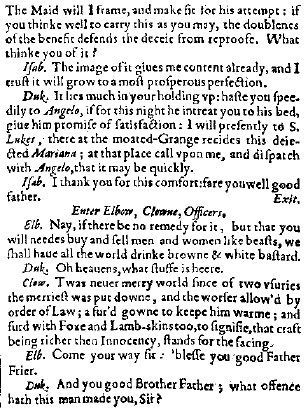|
|
advantaged, and the corrupt deputy scaled. The maid
will I frame and make fit for his attempt: If you
think well to carry this as you may, the doubleness
of the benefit defends the deceit from reproof.
What think you of it?
|
|
|
|
ISABELLA.
The image of it gives me content already, and I
trust it will grow to a most prosperous perfection.
|
|
|
|
DUKE.
It lies much in your holding up. Haste you speedily
to Angelo; if for this night he entreat you to his
bed, give him promise of satisfaction. I will
presently to Saint Luke's; there, at the moated
grange, resides this dejected Mariana; At that
place call upon me, and dispatch with Angelo, that
it may be quickly.
|
|
|
|
ISABELLA.
I thank you for this comfort. Fare you well, good father.
|
|
| Enter [Duke], Elbow, Clown, Officers |
|
|
ELBOW.
Nay, if there be no remedy for it, but that you will
needs buy and sell men and women like beasts, we
shall have all the world drink brown and white bastard.
|
|
|
|
DUKE.
O heavens, what stuff is here
|
|
|
|
POMPEY.
'Twas never merry world since of two, usuries the
merriest was put down, and the worser allowed by
order of law; a furred gown to keep him warm; and
furred with fox and lamb-skins too, to signify, that
craft being richer than innocency stands for the facing.
|
|
|
|
ELBOW.
Come your way sir: 'Bless you, good Father Friar.
|
|
|
|
DUKE.
And you, good Brother Father; what offence hath
this man made you, Sir?
|
|
|
 |
